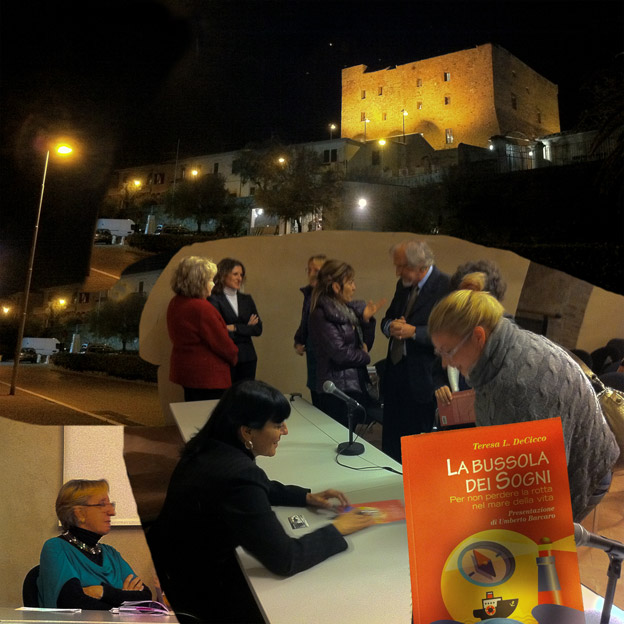As the new university year starts up I see the students piling back onto the campus. While on campus earlier this week I ran into a student who had taken my 3rd year dreams and dreaming course last year. Part of the course entails doing dream interpretation on one's own dreams over the course of 12 weeks. This student told me that she still uses the dream interpretation methods that she was taught in class and that her dreams now make sense to her. She was happy to report that her dreams have a message for her and that the messages are relevant to her waking life. Of course I was delighted to hear that my teachings are being practiced and that they are helping people, however, the most important message for me was that dream interpretation is doing the work that it is meant to do: it brings conscious awareness to one's waking day.
The whole point of dream interpretation is to bring thoughts, feelings and behaviours into the conscious mind. It is with this awareness that one can live a life more fully and certainly more clearly. Awareness is the path to living a fulfilled life. Awareness stops the unconscious patterns and reactions that bring forth the same results. Awareness is what bring's one's life to it's purpose. If this can happen with dream interpretation, then this is work that is well worth the effort.
Sunday, September 13, 2009
Subscribe to:
Post Comments (Atom)




Il contributo alla presa di coscienza che il sogno può dare è grandissimo.
ReplyDeletePer esempio:
se una persona ritiene di essere solo vittima , ricevendo sempre l’aggressività degli altri e poi scopriamo che nei sogni ci sono spesso immagini di violenza ( o subita o fatta poco importa ) ,
credo che questa persona debba fare i conti con la parte violenta che è dentro di sé più che fuori.
In questi giorni io ho potuto sperimentare un’altra funzione del sogno , più legata al ” problem solving “.
Sono infatti stata a Barcellona , in Spagna , una città bellissima ,
molto più grande e “complicata” della mia (Piombino , Italia).
Tutto era un problema da risolvere:
da come funzionava il portabagagli ( che era automatico e elettronico , senza l’omino che ritira i bagagli , come siamo abituati in Italia ) a come funzionava la serratura dell’appartamento.I percorsi ( le strade) per esempio , erano tutti da imparare.
I miei sogni a Barcellona erano più confusi di sempre , forse per lo stress dovuto alla situazione non familiare , riguardavano i problemi che mi trovavo ad affrontare , gli ambienti nuovi e superaffollati che incontravo ; mi aiutavano senz’altro a gestire lo stress e a risolvere i problemi.
Tornata a casa , a Piombino ho iniziato di nuovo ad avere i sogni con le caratteristiche precedenti , e a sognare cose che riguardano le mie problematiche di vita…
When we travel and change locations we are thinking of new things and doing new actions. As illustrated by Donatella, what we think about and do in waking life, we dream about. Our dreams are part of our own stream of consciousness and therefore, they change as we change. They change as we are exposed to new environments and new thoughts. Our dreams are a part of us, just as our physical body is. If we make changes in our diet, our body changes. Similarly, when we change our consciousness by travelling, learning new things or activities, our dreams reflect that as well.
ReplyDeleteInterestingly, when we change locations often the dreaming mind becomes more active and obvious.
Last night, or more exactly, early in the morning, just before that I would wake up, I've had a very vivid and long dream. The contents of that dream, in terms of charachters, site, plot, dialogues, feelings, the moment in which the dream came and finally the quality of its light and colours noticed me, when I woke up, that it was a particularly important dream. I began to reflect on it, and slowly a whole array of meanings started unfolding into my mind. A pair of them seemed to me to be more relevant than others, so I got a sufficiently accurated idea of which area of my life I have to focus on, following the message of the dream.
ReplyDeleteBut in her opening post Teresa uses a most specific term : "awareness". As David Bohm pointed out, "awareness" is slightly but noticeably different from "attention" or "consciousness". It is a form of attention applied to action, something very similar to attentiveness or concentration in action.
This is the part I find it the most difficult (and in the mean time the most valuable)in dream working: to traduce the dream message in a precise hint for action. It must be said, however, that this aim should not be pursued too hard, at risk of embarking in kind of a "dream-interpretation-engeneering" where the excess of finalization would simply shut off any communication with dreaming mind. Thus one should try to let the correct hint (both directed to precise action or to general growth in wisdom) emerge almost spontaneously, which, in my opinion, fits with the fluidity that awareness requires.
Very challenging and intriguing tasks!
Capisco e sono d'accordo con te ,Massimo
ReplyDeleteMa mi sembra che tu metta in dubbio l'ipotetico ruolo del sogno nel "problem solving"
Come vedi questo difficilissimo rapporto
( sogno - problem solving)?
Although Donatella in general agree with my post, she had the impression that I would question the role of dreams in problem solving. Thus she asks me how I see that role and what she defines "a very difficult relation (dream-problem solving) as well.
ReplyDeleteMost likely I see it as you do, Donatella, that is the relation dream-problem solving at times may be very difficult. I'm prone to believe that troubles can be of two orders: in the first one they are brought about by our thick, hasty and greedy ego. In the second one there may be so much in the dream itself. In my opinion, and I know that not all agree with it, dreams are able of being very tricky at times! But the teaching that we can get coming to terms with our "tricky side of dreaming" are of the most value.
I agree with Teresa when she indicates a way: the careful comparing dreams with waking life, also with the details.
I strongly believe that everybody could and should take advantage from being aware of one's own dreaming. Nevertheless a great committment is needed, if one wants to get great help from it.
Sarebbe senz'altro interessantissimo mettere in luce l'"azione" dell'EGO sui nostri sogni ....così da poterla distinguere dal messaggio centrale che il sogno ci vuol dare...
ReplyDeleteMy late therapist Francesco Mina, as a metaphor, used to compare the Ego to a shopkeeper which is always busy in selling to clients, buying from suppliers, making up a catchy shopwindow, bargaining in any circumstances in order to keep costs low, prices reasonable and finally good earnings etc.
ReplyDeleteEverybody knows how nice it is to have a good and honest shopkeeper in the neighborhood. So should be our Ego, allowing us to survive, grow and flourish in our world of separate things and people. Unfortunately very often our Ego acts like a tricky trader, cheating on prices, quality of goods and so on... obviously, in the long run, behaviours like this generate a growth of mistrust, feelings of being threatened, greed and, most of all, the necessity of telling lies more and more.
Therefore, when our Ego acts as a good shopkeeper, it allows us to translate the language of continuity and wholeness, peculiar of dreaming and primary processes, into the language of communication between separate actors and experiences. Conversely, while acting as a dodger, it hinders understanding and discoveries about ourselves, because there is something to conceal. When there are clues of it, the dreamworker clothes him or herself like Sherlock Homes or a public prosecutor, because there is something very interesting to discover, even though our tricky Ego doesn't agree!
But in the end, otherwise than in a law court, instead of being sentenced, our frightened Ego will receive a good reward - in terms of well being and life's meaningfulness - by re-establishing a more sincere relationship with the wholeness of its own self and of the world.
Bell'esempio!
ReplyDeleteIl tuo terapeuta era un vero maestro!
Indeed Massimo sums up very nicely the work of our dreams. It is always the ego that lurks; keeping us from really knowing ourselves. It takes a brave and courageous being to look at the message in dreams and then to take appropriate action in waking day. It seems to me that we will often avoid knowing who we really are, and at times, at all cost. Denial, addictions, bad relationships and all the pain that these things bring are just the drama that keep us from our own truth. Well put Massimo....by doing our own work with dreams we are in the end very well rewarded!
ReplyDelete